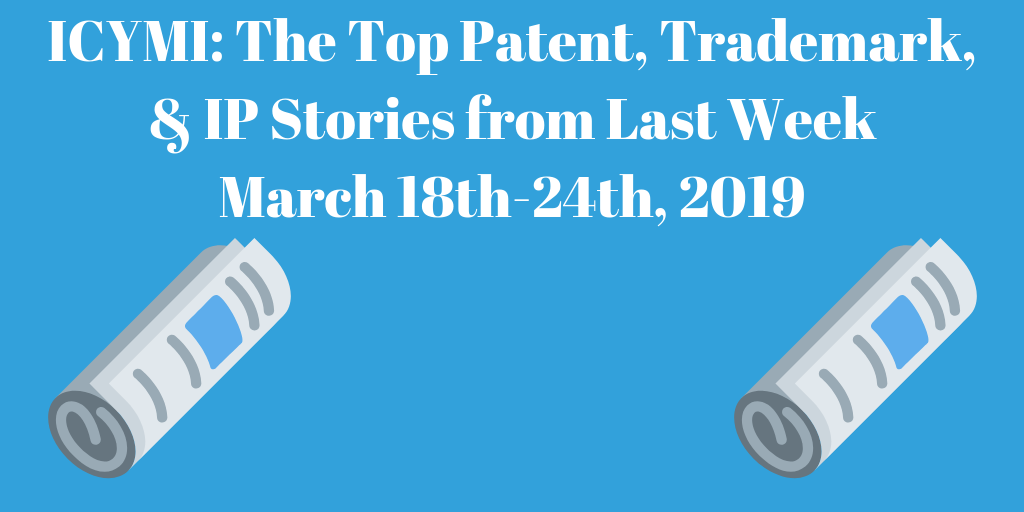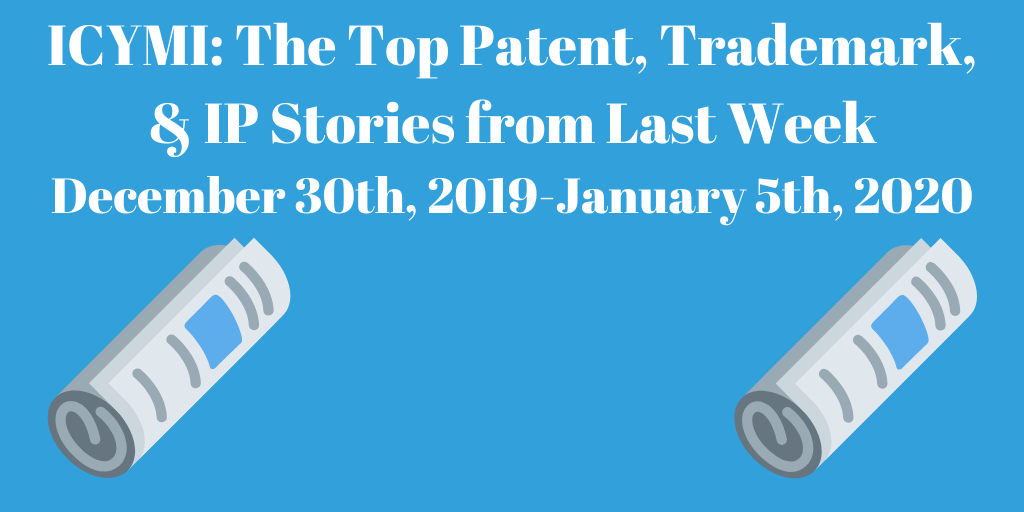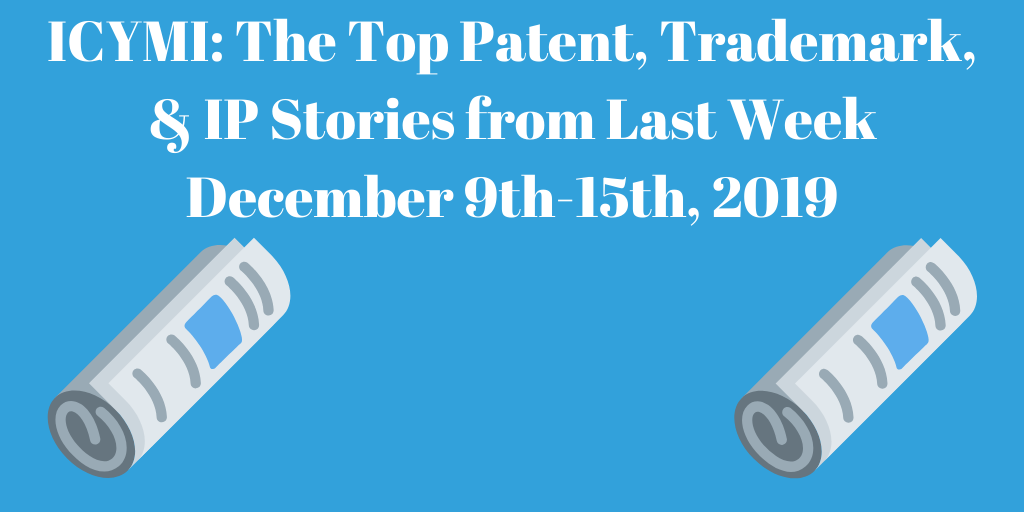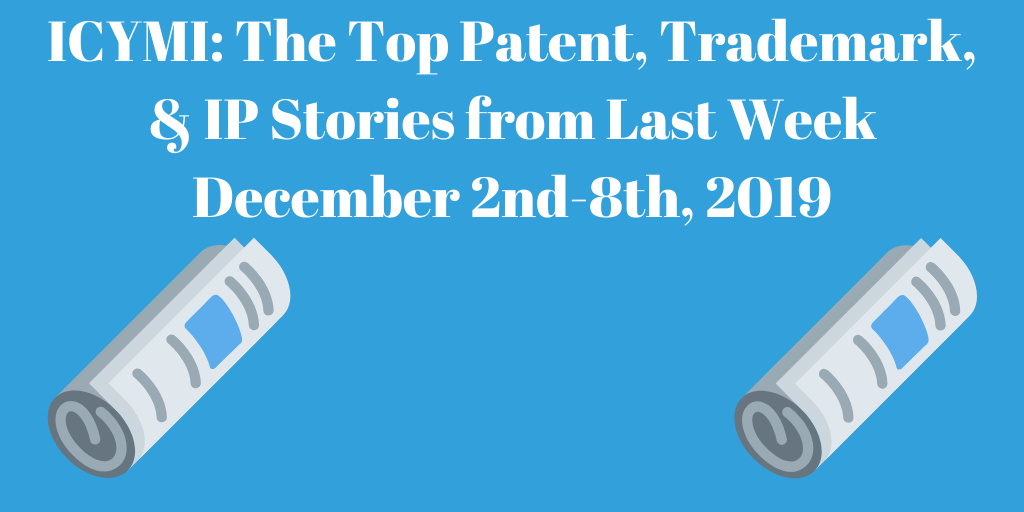Top Patent, Trademark, and IP Stories from Last Week (3/18-3/24/19)
Every week, we will be highlighting the top patent, copyright, trademark, intellectual property, etc. stories of the previous week in our “In Case You Missed It” segment. The list itself is in no particular order and includes a wide range of stories from the patent world that are informative, noteworthy, or just plain bizarre. The stories included encompass everything from Supreme Court cases to insights into growing industries. Please feel free to comment your thoughts on the stories or share an important one we missed!
1.) “Huawei Leads Asian Domination of U.N. Patent Applications in 2018”
Despite being the target of U.S. investigations and massive IP theft accusations, the embattled Chinese telecommunications and electronics giant Huawei accomplished a massive feat in 2018. The company submitted 5,405 patent applications to the World Intellectual Property Organization (WIPO) last year, up from 4,024 in 2017 (~25% increase). This led all companies across the globe and set an all-time record for most filings in a year. The next closest filer in 2018, Mitsubishi Electronics, pales in comparison with just 2,812 filings.
Huawei led the Asian domination for fillings. Asian-based companies collectively accounted for 50.5% of all filings from companies across the globe. WIPO director general Francis Gurry noted both Huawei and Asia’s domination was a “very, very significant result.”
With the help of Huawei, China was able to nearly claim the number one spot for most filings by a country with 53,345. This figure lagged only the U.S. who had 56,142 filings. Nonetheless, the country is expected to inevitably get the top spot given they filled 9.7% more applicants in 2018 than 2017. Look for China to continue dominating the IP race. To read more about this story, click here (via Reuters, March 18th, 2019).
2.) “Apple is Afraid of Inventors, Not Patent Trolls”
In his article, inventor Josh Malone lays out the case that Apple, Google, and other tech giants are not so much afraid of patent trolls, but rather inventors themselves. Malone argues that these tech giants have effectively stolen inventions and then utilized massive amounts of resources to force inventors to drop their suits. These tech giants have destroyed the U.S. patent system by spreading propaganda and paying “lawyers, academics, lobbyists, and politicians,” he argues.
As an inventor, Malone’s troubles are not only with the tech giants themselves but with what their efforts have resulted in. Their legal endeavors have gradually chipped way at intellectual property rights. He points to eBay Inc. v. MercExchange to demonstrate how inventors are no longer able to determine “who gets to use our inventions or how they are used.” He points to the creation of the Patent Trial and Appeal Board who is tasked with “revoking our patents.” He points to the TC Heartland LLC v. Kraft Foods Group Brands LLC which requires inventors to file suit in their state of incorporation. All of these rulings have emerged after the dot-com boom and the influence of Silicon Valley.
Malone goes on to argue that the “coup d’etat” was the 2018 Oil States Energy Services, LLC v. Greene’s Energy ruling which “[stripped] inventors of the protections of an Article III court and a trial by jury.” Rulings like these have created a system whereby small-time inventors have “virtually no chance.” Most of them are unable to shell out the millions of dollars and years in court necessary to defend their inventions against conglomerates. Such outrageous litigation costs discourage inventors from R&D as well as private investors from funding their ideas.
Malone concludes the piece with his own troubling example. For four years, he has been in a legal battle with Wal-Mart, Telebrands, and others who ripped off his invention. These companies were able to file hundreds of motions and thousands of documents in an attempt to force Malone to fold. His legal bills reached tens of millions of dollars. He continued to fight.
Even though a jury sided with Malone in 2017, he still has not been paid. On top of that, appeals continue to delay any final ruling. It is a disturbing example of how companies with tremendous amounts of resources are able to thwart justice for small-time inventors. To read more about this story, click here (via IPWatchdog, March 21st, 2019).
3.) Cardi B moves to trademark ‘Okurrr’
On a lighter note, Grammy Award-winning rapper Cardi B has filed a trademark application for her signature “Okurrr” catchphrase. The phrase, produced by rolling the R’s, is not necessarily new but could be argued was brought to the mainstream by the rapper. Most notably, her use of it was the center of a Super Bowl Ad and segment on the Tonight Show.
Whether her influence and association with the word is enough to grant her legal ownership is yet to be seen. She will undoubtedly run into potential problems given it is not a new concept. In fact, there are Urban Dictionary entries about it from almost a decade ago.
Regardless, there are plenty of celebrities who have trademarked phrases so it is not entirely impossible. For example, Paris Hilton trademarked “That’s Hot.” In Hilton’s case however, she created the phrase. Cardi B will have a more difficult case. To read more about this story, click here (via Forbes, March 23rd, 2019).
4.) “A Twitter User Is Suing F*ckJerry for Copyright Infringement”
The growing popularity (and profitability) of Instagram meme accounts has led to a rise in content theft and so-called “freebooting” on the platform. “Freebooting,” the act of uploading stolen content to one’s own account for personal gain without the creator’s permission, is becoming a new legal gray area.
Freebooting accounts rake in millions of followers and hundreds of thousands of dollars in endorsement deals using their influence. An account with 100,000 followers can easily fetch $5000 for an advertisement post. There is little creators can do when content is stolen.
Elliott Tebele aka @F*ckJerry (you can guess what the asterisk is for) is one of the internet’s most well-known freebooters and rightly so. Tebele has amassed 14 million followers on Instagram through his freebooting, receiving massive backlash from comedians and content creators alike. Criticism turned to legal action for one Twitter user however who decided to take Tebele to court.
Twitter user Olorunfemi Coker, who has his own cult following with 133,000 Twitter followers, is suing Tebele on the basis of copyright infringement. Tebele screenshotted Coker’s tweet and then posted it to his own account without permission, using it to advertise a tequila brand. Lawyers for Coker argued that stolen content, even if not tied directly to an advertisement, still adds value to the F*ckJerry brand by growing the user base and driving more advertisers.
This is not the first case to be levied against freebooters however it will undoubtedly alter the laissez faire state of copyright infringement on the web given Telebe’s prominence. To read more about this story, click here (via Vulture, March 22nd, 2019).




